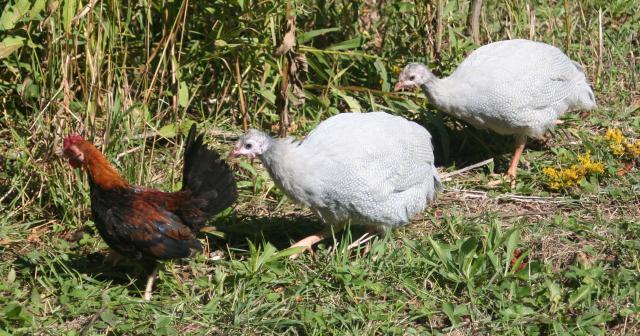I got mine as 3-day-old keets, so if you're getting adults, it will be different in some ways. They were kept in a make-shift wire "pen" which was several feet of fencing wire looped around back to itself (with a net covered in branches and leaves to deter them from trying to fly up through), right next to the chicken coop and in their foraging territory during the day. This way they were able to interact minimally with the chickens but not be bullied, and I would intentionally feed them right next to each other on either side of the fencing so they would get used to sharing personal space. I have several silkies, dark Cornish, and an Old English Game hen in this area, and of them all the only one who tries to intimidate the keets is... of course, the silly little OEG hen. While she's smart, they're much smarter and quicker, and seem to take great pleasure in messing with her - their actions aren't violent in the least, but they play around and do things they know will tick her off just to get a rise out of her.
Just a few nights ago I decided to see if one of my two loner silkie roosters, Brockles, would get along sleeping with them. They're about half-grown as I write this. The nights are getting chilly here, and I don't like him sleeping off by himself. Turns out they get along great. They all hang around him during the day when outside.
From what I have been told by guinea keepers around my area and read online, they are much better with chickens if they are introduced to them at a young age. I've heard a lot of people say they will bully the chickens (not sure of the extent) at roost if they grew up separate from the other. They think on very different wavelengths than chickens, and have great differences in their body language and mannerisms, so if they don't have time while younger and more impressionable to get to know each others' ways, it feels more likely that they'd not get along as well in shared space.
Another thing I'd like to add is that, in my own experience being around them and observing behavior, the white ones seem to be the most "mellow" in their temperments. So the particular coloring you're getting may also effect their chances of getting along. Then again, each individual is different.
Is it possible the ones you may buy have been raised around chickens?





